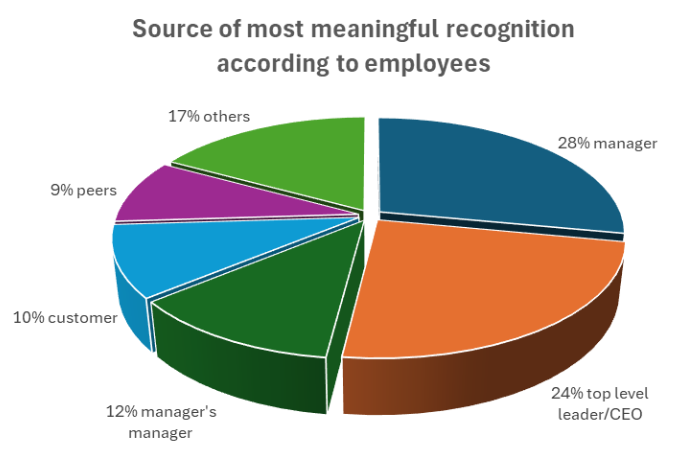Employee recognition programs are another tool for HR managers to boost morale and productivity. Get to know more about their benefits here

For HR managers, the importance of keeping employees happy cannot be overemphasized. A happy employee is more productive and loyal, which contributes to company profitability.
That’s why HR professionals have come up with many ways of increasing or maintaining their employees’ happiness. One tool that can help keep staff happy in their jobs is an employee reward and recognition program.
Many Canadian companies recognize this fact, and so they make sure to offer some of the best employee recognition programs. Do these programs work? What are the best employee recognition programs in Canada? Benefits and Pensions Monitor will provide answers to these and more.
What are the best employee recognition programs?
Here’s a small sample of some companies in Canada with robust employee recognition programs. Have a look at their programs, and perhaps you can apply some of their principles and measures for your company too.
1. Golden Hippo
This Canadian e-commerce company makes and markets products for the health, beauty, and pet care spaces. For their employee recognition program, they have a Win of the Week program which involves giving spot bonuses and shout-outs to worthy workers.
Golden Hippo continues to look for novel ways to share employee wins and stories both within and outside of the company via their social media channels.
2. Edmund’s
Edmund’s is a renowned publisher of vehicle guides, listings, and reviews that assist consumers in making informed purchases. Their employee recognition program consists of a President’s Club. This is a badging system where high-performing workers vie for Diamond, Platinum, and Gold Tiers with corresponding rewards. Every month, Edmund’s holds company-wide calls to announce the top sales performers.
3. FullContact
FullContact is a SaaS provider that allows brands to collect customer data, then customize their advertising materials and customer experiences. Part of its employee recognition effort is a peer-to-peer recognition program that allows its workers to praise colleagues and give them reward points.
These reward points can then be exchanged for gift cards at thousands of different vendors.
4. Lululemon
Yes, one of the biggest fitness apparel companies in North America is Canadian. Lululemon does a significant portion of its employee recognition via their LinkedIn page and other social media channels. And just recently, they held a huge, company-wide celebration for their tenured employees who have passed the 10- and 15-year marks of working at the company.
Other employee recognition efforts at Lululemon include a team-based cash bonus program that rewards teams that reach store-based goals.
5. Canadian Imperial Bank of Commerce
CIBC’s recognition program is designed to award those who excel in teamwork, innovation, and service. What is unique about CIBC’s recognition program is that it’s probably one of the most inclusive, especially for a large bank. Their recognition program is notable, since it extends from frontline workers all the way up to top-level executives.
What are the fundamentals of employee recognition programs?
More than giving high fives or verbal praise, an employee recognition program should make workers feel valued by their employer. Employee recognition programs are a means of recognizing the accomplishments of deserving employees or teams in a company.
With a program like this, many Canadian companies recognize employees who do good work and reward them for their efforts. Employee recognition can come in many forms that often boost employee engagement.
This can include work anniversaries, gift cards, company outings, and company anniversary celebrations. Company-wide programs or activities like these can be effective in increasing workers’ morale and retaining top talent, all while forging the bond between employees and the company.
The importance of employee recognition in the workplace
Benefits like being able to work from home or ensuring that workers can have a healthy work-life balance is only a part of what Canadian companies do to keep employees happy. Employee recognition is another essential part of employees’ overall happiness, which translates to how they feel about working for their employer.
After they and their work are given due recognition and rewards, a happy employee also becomes an engaged employee. What does this mean?
Why employee engagement matters
Employee engagement has become a top priority for many companies across the globe, and Canada is no exception. An engaged employee is the holy grail of HR staff – if a company’s employees are engaged, the company can expect high productivity and profitability.
Employee engagement is the degree by which an employee is committed to helping their organization achieve its goals. This is evidenced by their sentiment towards their work, the company they work for, and the people they work with. The more engaged the employee, the more they’ll have a positive attitude for their employer, their colleagues, and the work they put out.
An engaged employee cares about:
- the quality of their work
- the welfare and well-being of coworkers
- the values and state of the company
When an employee is engaged by their company, they are more emotionally invested. On the other hand, an employee who is less engaged has less concern for the company, and whatever they do or whoever they deal with daily.
Employee recognition is a surefire way to boost employee engagement. These are some of the payoffs of making sure that employees feel valued and engaged by their employer:
- Enhanced motivation - employees who are recognized for their hard work and dedication are more motivated to work and perform at their best. Knowing they are valued, and that their efforts won't go unnoticed, can be very encouraging for employees.
- Better connection - having an employee recognition program that sees and rewards good work creates a deeper emotional bond between employees and their workplace. Recognition gives employees an intangible but valuable payoff: a sense of belonging and commitment.
- Enhanced productivity - engaged employees are more productive and feel more driven to excel when they know that their efforts will receive due recognition. And, as increased productivity translates into higher performance levels, the individual employee and the organization can only benefit.
- Better company culture - having engaged employees results in a company with a supportive work environment where employees thrive. This often translates to a better work ethic and high-quality work that even clients and customers will notice.
How employee recognition programs can reduce employee turnover
As with programs like employee benefits packages, the main purpose of an employee recognition program is to improve or maintain employees’ overall well-being and happiness.
When an employee recognition program is established and rewards are consistently given to high performing employees, workers will see the workplace as supportive and trustworthy. Recognition given to peers boosts connections among employees, translating into a more engaged workforce. This is what primarily reduces employee turnover rates.
Employees who receive due recognition for their efforts are unlikely to leave their employers. Employees who work at a company where they feel valued stay to build their careers.
Should employee recognition programs be monetary?
When it comes to recognizing the efforts or achievements of individual employees, the inevitable question arises: should the rewards be in the form of bonuses or cash prizes? The answer might surprise you.
According to a recent Gallup poll, it was found that employees were more appreciative of recognition that was authentic, honest, and fit the individual employee. Bonuses, gift cards, paid vacations or any monetary rewards may sound appealing, but these sorts of rewards were not always the most memorable or appreciated.
This shows that acknowledging an employee’s performance doesn’t always have to be expensive. It can be as simple as a thank-you note. What’s important is that the recognition is meaningful and who gives the praise. For example, the same Gallup poll revealed these figures:

Seeing these numbers, managers and team leaders should remember that recognition coming directly from them can mean a lot to their employees.
That same Gallup study listed which types of recognition were the most memorable for the employees polled. These are what respondents said (ranked from most to least memorable):
- an award, certificate, or commendation given publicly
- private, personal recognition from a supervisor, colleague, or customer
- seeing their work or performance rating raised by positive reviews or evaluations
- getting promoted or more responsibility as proof of the company’s trust in them
- financial awards in the form of a raise, a free trip or prize
- a feeling of personal pride or satisfaction in their work
An effective employee recognition program resonates with a person’s highest need for accomplishment, and to be seen and appreciated for those accomplishments. You can have the most sought-after benefits in the country, but employees still need to know that they and their work are valued. Without these validations, employees will lose their sense of purpose. This turns into feelings of being underappreciated and unmotivated, causing them to leave their jobs eventually.
You can watch this video for tips on making an effective employee recognition program for your organization’s needs:
Employee recognition programs contribute to employee happiness
Your company’s employee rewards and recognition program should be geared towards making employees feel that they are valued team members. Formulating and executing this well can mean attracting and keeping top talent, and your company can enjoy other benefits like increased productivity and higher profitability.
And the good news is, it doesn’t have to cost that much. Many employees don’t put that big a premium on monetary rewards – when it comes to employee happiness, recognition can trump renumeration.
What sort of employee recognition program do you envision for your company? Let us know in the comments below



